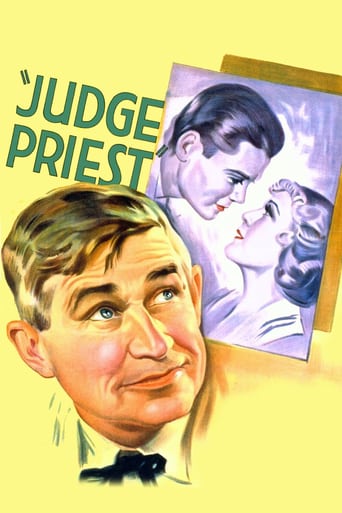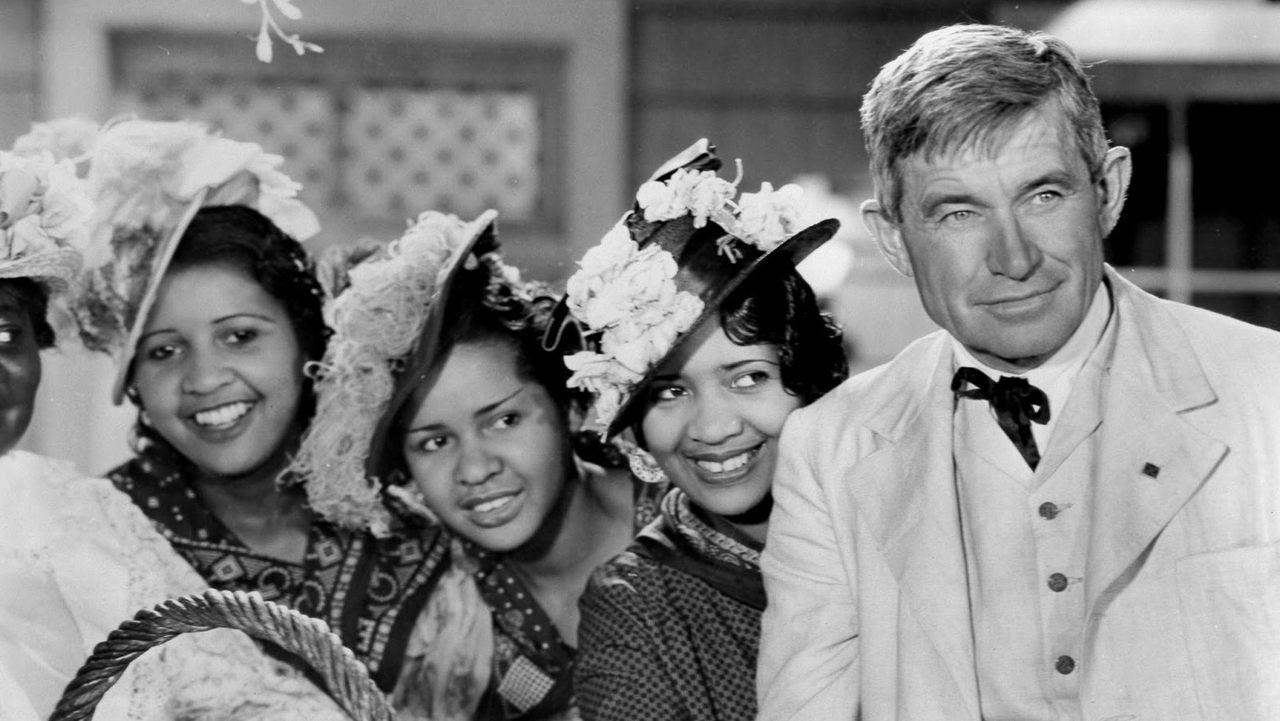lugonian
JUDGE PRIEST (Fox, 1934), directed by John Ford, stars humorist/actor, Will Rogers, not playing a priest but a judge whose last name happens to be Priest. A touch of Americana set at the turn of the century, this is the sort of story with folksy characters both Ford and Fox Films are noted for, past, present and future. Often claimed as Rogers' best movie, it's not centered upon his character throughout its 80 minutes but often upon its citizens of the community, many being Civil War veterans and former slaves. The title character, however, is based on Irvin S. Cobb stories said to be lifted from characters from his childhood. The opening passage by Cobb himself is as reads: "The figures in this story are familiar ghosts of my own boyhood. The War between the States was over but the tragedies and comedies haunted every grown man's mind. The stories that were swapped took deep root in my memory. There was one man down yonder I came especially to admire, for he seemed typical of the tolerance of that day and the wisdom of that almost vanished generation. I called him Judge Priest, and I tried to draw reasonably fair likeness of him and his neighbors and the town in which he lived."In Old Kentucky Town, 1890: William Pitman Priest (Will Rogers), is a small town judge of the circuit court. While on the bench reading the comic pages of a local newspaper, he forces himself to endure the testimony of Horace Maydew (Berton Churchill) on the floor for the trial of ex-slave/chicken thief, Jeff Poindexter (Stepin Fetchit). Because Jeff knows the best fishing places in town, rather than sentence him to jail, the judge dismisses the trial only to spend the day fishing with him. Judge Priest's nephew, Jerome (Tom Brown), affectionately called "Rome," has returned home after graduating from a northern law school. He's in love with Ellie May Gillespie (Anita Louise), his childhood sweetheart living next door. Because nobody knows about her heritage and questionable background, Rome's snobbish mother, Carrie (Brenda Fowler) prefers Rome be going with an upper-class girl, Virginia Maydew (Rochelle Hudson). Though Ellie tries to let Rome off easy by going with the uncouth Gabby Rives (Matt McHugh), Judge Priest makes sure nothing develops from that relationship. Also in town is the mysterious Bob Gillis (David Landau), a blacksmith who says little and keeps very much to himself. Because Flem Talley (Frank Melton) quips some unkind words about Ellie May passing his barber ship, Gillis socks him to the floor in anger. Later Flem and his friends attack Gillis in a bar in vengeance. Gillis defends himself with a knife, wounding Flem. Gillis gives himself up to authorities, hires Rome as his attorney for the upcoming trial. Before the trial commences, Judge Priest is forced to withdraw from the case and have Judge Floyd Farleigh (Winter Hall) taking his place. While the trial seems to be going against Gillis for refusing to testify on his behalf, the Reverend Ashby Brand (Henry B. Walthall), a character witness, steps in with a very surprising testimony.Others members of the cast include: Roger Imhof (Billy Gaynor); Charley Grapewin (Jimmy Bagby); Hattie McDaniel (Aunt Dilsy); and Si Jenks. Francis Ford (John's brother) gets plenty of laughs as a tobacco chewing drunk looking for a good place to spit, even in the courtroom and parade. Other bits of nostalgia include taffy pulling and gathering of folks at functions or Sundays at the Episcopal Church.A well done comedy-drama with Will Rogers giving a commendable performance. Aside from his laid-back character with interesting things to say, he has somber moments too, where he talks to the photo and tombstone of his late wife, Margaret Breckenridge Priest, for comfort. He's a lonely man who, refusing to remarry, makes things right with others in the community. Hattie McDaniel, playing the maid, sings the traditional theme song, "My Old Kentucky Home." While the Judge Priest character was played earlier in a silent Will Rogers movie, BOYS WILL BE BOYS (Goldwyn, 1921) that role was enacted by another performer named Edward Kimball. John Ford brought back Judge Priest to the screen in THE SUN SHINES BRIGHT (Republic, 1953) by which Charles Winninger took over the old Will Rogers role with Stepin Fetchit once again playing Jeff Poindexter.Unavailable for viewing until the 1970s when JUDGE PRIEST emerged in revival movie houses, and decade later when introduced public television. Because it's become a public domain title, JUDGE PRIEST was distributed on video cassette by various companies (some including black screen exit music following its closing cast credits). Also available on DVD with Will Rogers' other comedy-drama, DOCTOR BULL (1933) on its flip side, and occasionally found on cable television, ranging from Encore Westerns to Turner Classic Movies (TCM premiere: May 9, 2006). While some of the humor and stereotypes might not prove favorable to contemporary viewers, for anyone who's never seen a Will Rogers movie, maybe JUDGE PRIEST would be a good introduction anyway. "Here, here. Court called to order." (***1/2).
utgard14
Episodic comedy from John Ford that is a showcase for Will Rogers to do his homespun wisdom routine that made him famous. He plays the title character, a judge who helps a young couple being kept apart by meddling parents and helps a blacksmith charged with assault. It's a bit of a mixed bag. Rogers is good and he gets fine support from Henry B. Walthall, David Landau, Berton Churchill, and Charley Grapewin. But there's very little meat on the bone here. It's a slow-moving picture that seems content to shoot for the occasional amused grin rather than try for many laughs. Add to that the cringeworthy performance of Stepin Fetchit and you have a film whose appeal is pretty narrow.
classicsoncall
Well the film may be all 'Aw shucks' and corn pone but it held an odd and entertaining fascination for me. I'd never seen Will Rogers in any type of vehicle before but knew that his homespun folksiness and insight into humanity were legendary. No doubt many from today's vantage point will find the picture's treatment of blacks to be condescending and offensive. However one would do well to consider it within the context of it's era, depicting an even earlier time in our country's history during the 1890's. As Judge Priest's (Rogers) maid Dilsey, Hattie McDaniel is a delight to behold, merrily singing away as she performs her chores while offering a unique counterpoint to the dimwitted and subservient Jeff Poindexter. Yes, Stepin Fetchit can be painful to watch at times, and every time I've seen him he's been a stereotype, but the man obviously had something on the ball to become the first black millionaire in the entertainment industry.The main story revolves around an unobtrusively quiet citizen of the town who's brought up on charges of stabbing the local barber (Frank Melton). Quite honestly, Flem Talley's laugh alone was enough to drive me up a wall, and though I wouldn't say it about someone in real life, the character in this picture literally had it coming. Through gradual exposition we learn that Bob Gillis (David Landau) is the father of a local town beauty (Anita Louise as Ellie May Gillespie) being romanced by the Judge's nephew (Tom Brown), and also a hero during the Civil War for the Confederacy.At times lively and raucous and at others quite serious and somber (Henry Walthall's testimony as Reverend Ashby Brand), "Judge Priest" is a genuine gem coming out of the early 1930's, a time when film makers were still finding their way out of the silent era. It deserves a modest recommendation for it's folksy and humorous approach, and if there's one line that I had to replay three times to be sure I heard it right, it was the one uttered by the old codger offering the Judge a swig of his home made corn whiskey - "You can smell the feet of the boy that ploughed it!" I'm really going to have to reconsider my choice of spirits in the future.
samhill5215
There's quite a lot to recommend this one, the John Ford touches mainly. The way the scenes are arranged, the attention to detail are his trademarks. His direction is tight, focused, the actors deliver their lines in a believable, realistic manner. Nothing stagy about this. As for the actors they performed pretty much as expected. Will Rogers was his usual self, not the greatest of thespians but entertaining nonetheless. Anita Louise was simply delicious. I don't think I've ever seen her in better form and I credit Ford for extracting that performance as well as Tom Brown's who managed to keep his earnestness and wide-eyed innocence under check. Even stone-faced David Landau and bombastic Berton Churchill managed to give their stereotypical parts some originality.My ambivalence is about the overt racism here, even granting the film's time frame and the period in our history it depicts. The least of it is that two of the central characters, Hattie McDaniel and Stepin Fetchit, are listed last in the credits, after Juror No. 12, whose only contribution was hitting the spittoon during the court scenes. Frankly it was difficult to watch despite some genuine tender scenes between the Rogers character and his servants. The one that stands out has him and McDaniel singing an impromptu spiritual and that one alone is worth the price of admission. The judge's relationship with the Fetchit character is much more problematic, even granting the "Coon" persona that Fetchit employed so successfully in his career he became a millionaire. There were just too many instances of the judge ordering him about just for the sake of it. It's painful to consider how humiliating it must have been for these two talented professionals to adopt their screen personae in order to earn a living.I know I'm judging this film by 21st century standards, seventy-seven years after its release and if nothing else one might say that it exposed our country's shameful past, let the sunlight in on our deep, dark, secret. And in all fairness this is a film about southerners right after they had lost the Civil War. One can't really expect them to feel and express any remorse. People don't work that way. So from that angle I have no qualms. If anything I suspect the presentation of that society was probably mostly accurate. But I wonder at the motivations of the society that felt the need to make a film such as this, about a society that existed seventy years prior. And given Ford's sympathetic, realistic, treatment of American Indians in his later Westerns I wonder if he wasn't making just that point.


 AD
AD


